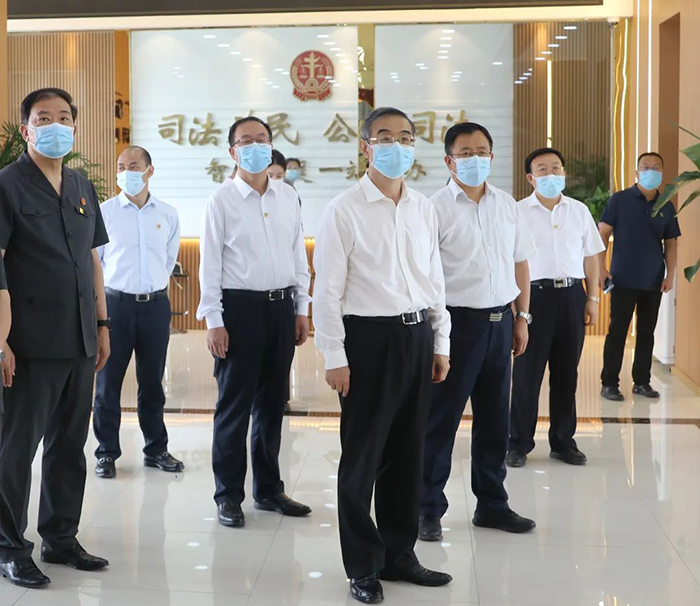Zhou Qiang reiterates strong judicial support for a beautiful Ningxia
Zhou Qiang, president of the Supreme People's Court (SPC), reiterated that the court will provide strong judicial support in building Northwest China’s Ningxia Hui autonomous region into a modernized and beautiful land during his visit to the region from July 14 to 16.

Zhou Qiang, president of the Supreme People’s Court (SPC), visits the Minning tribunal in Yongning county, Northwest China’s Ningxia Hui autonomous region. [Photo/ court.gov.cn]
At Minning town in Yongning county, a successful model of the collaboration on poverty alleviation between the eastern and western regions, Zhou visited the Minning tribunal of the Yongning county court and urged the local judicial staff to carry forward the momentum of poverty elimination, give full play to the role of the people's court and serve the effective coordination between poverty elimination and rural vitalization. The Minning tribunal was established after residents were relocated there, which witnessed and participated in the town's transformation from "a dry beach" to "a golden beach".
Located at the upstream of the Yellow River, Zhongwei city is seated in the key ecological shield area of the northwest region. The city's Intermediate People's Court has striven to safeguard the environment of the "water city in the desert" through legal measures. Zhou acknowledged the court's work in handling environment-related cases and advancing judicial reform, especially in handling a set of typical cases of great social significance. He called for further judicial efforts to safeguard the ecology of the Yellow River basin.
The People's Court in Qingtongxia city has fully tapped the frontline role of circuit court to serve the local people. Zhou visited the local staff and urged them to take root in the grassroots-level posts and strive to solve people's disputes in a timely manner.
The Intermediate People's Court in Yinchuan, capital city of the region, has striven to advance the reform of separating the handling of simple and complex cases in civil and commercial sector. The Xingqing district court established a dispute resolution model combining both judicial and industrial forces, which has boosted efficiency in dispute resolution. The Tongxin county court established a multi-functional litigation service center where services, including diversified dispute resolution, execution, deliveries and immediate judgement, are provided. Zhou acknowledged these achievements and called for further efforts in optimizing judicial resources, improving the coordination of litigation and mediation, as well as the one-stop diversified dispute resolution and litigation service system, so as to provide more premium, efficient and convenient judicial services.
Zhou also visited the rural governance center in Zhenluo town in Shapotou district of Zhongwei city, where forces in public security, the court, judicial offices and the city administration have been combined and a digital platform of comprehensive rural services put in place for a more streamlined and intelligent grassroots governance. Zhou pointed out that it was a full demonstration of the great strength of the socialist system with Chinese characteristics.
At the Ningxia High People's Court, Zhou held a symposium with local judicial staff where he heard the work report of the court and exchanged ideas with them. He fully acknowledged the achievements made by Ningxia's courts in trial and execution, judicial reforms and smart court construction and team building. He stressed the absolute leadership of the Party in judicial work and pursuing a holistic approach to national security to resolutely safeguard the country's political security and social stability. He called for comprehensive and accurate implementation of the new development concept in fostering a business environment that is market-oriented, law-based and up to international standards, as well as serving the coordination of epidemic response and socioeconomic development. Judicial reforms and smart court construction should be intensified to speed up the modernization of the trial system and the capacity, and a zero-tolerance approach should be taken in the fight against judicial corruption, he said.







